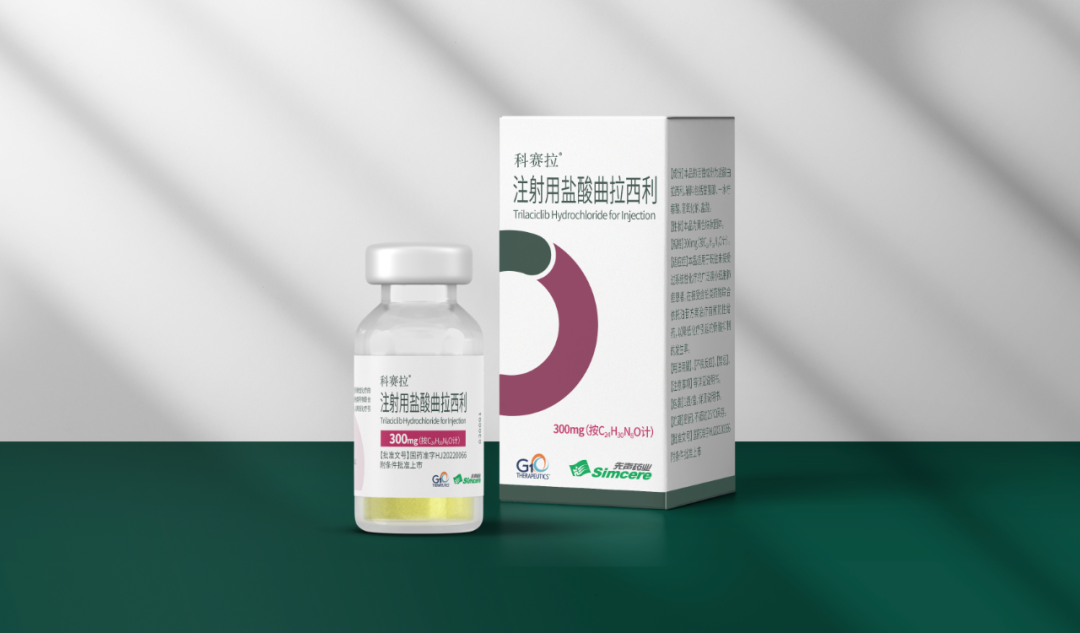October 10, 2022 – Simcere Pharmaceutical Group (2096.HK) today announced that a global multi-center pivotal phase 3 clinical trial (PRESERVE 2 study) of Trilaciclib, an innovative drug in collaboration with G1 Therapeutics Inc. (Nasdaq:GTHX), in patients with metastatic triple negative breast cancer (TNBC) has completed the enrollment of all 187 patients receiving first line trilaciclib or placebo prior to chemotherapy. The interim analysis is expected to be conducted in the second half of 2023.

PRESERVE 2 is a global multi-center, randomized placebo-controlled, line extension pivotal Phase 3 trial of trilaciclib in patients with metastatic TNBC receiving first line trilaciclib or placebo administered prior to GC. The regimen is given intravenously (IV) on Days 1 and 8 in 21-day cycles. Treatment is administered until disease progression. The primary endpoint is to evaluate the effect of trilaciclib on overall survival (OS) compared with placebo in patients receiving first-line GC. Key secondary endpoints include assessment of the effect of trilaciclib on patients’ quality of life compared with placebo, myeloprotection measures, progression free survival (PFS), and overall rate of response (ORR).
The study involved 112 clinical sites across the world, including 13 sites located in China. As part of the global study, the patient enrollment in China progressed rapidly. The first Chinese patient was randomized on January 7, 2022,and the enrollment of all 37 patients in the Chinese sites was completed on August 2, 2022.
“Triple-negative breast cancer is a highly aggressive malignancy that’s in need of more effective medication,” said Ms. Vicky Song, Simcere’s senior Vice President. “I am very pleased to see this global multicenter trial has reached an important milestone under the collaboration with our partners and clinical experts. Besides the study in Small-Cell Lung Cancer approved in China, two global Phase 3 pivotal studies of trilaciclib in which Simcere participated in China for patients with colorectal cancer and triple-negative breast cancer have both completed patient enrollment worldwide.”
“TNBC tumors are aggressive and difficult to treat; and while chemotherapy with or without targeted therapy remains first line TNBC standard of care, there is a great need to improve survival beyond that expected from it – particularly without increasing toxicity,” said Raj Malik, M.D., G1’s Chief Medical Officer. “PRESERVE 2 is exciting as it is evaluating trilaciclib in mTNBC to build on the robust survival benefit observed in the Phase 2 program. Completion of enrollment is an important milestone for G1 and the patients we seek to treat, and we look forward to the interim analysis, which is expected to occur in the second half of 2023. This is a registrational trial for which we have been granted Fast Track designation by the U.S. Food and Drug Administration - and if the results are positive, we will work closely with the FDA to expedite our regulatory filing for approval in this indication.”
Dr. Malik continued, “I’d like to thank the patients enrolled in the trial, the clinical investigators, our CRO partners, and the G1 and Simcere teams who worked together to reach this enrollment milestone.”
About Triple Negative Breast Cancer (TNBC)
According to the 2020 global burden of cancer by the Lancet, breast cancer ranks No.1 in patient population in the world, and No. 4 in China. There are about 420,000 new cases and 12,000 deaths attribute to breast cancer in China each year. Triple-negative breast cancer makes up approximately 10-20% of such diagnosed breast cancers. TNBC is cancer that tests negative for estrogen receptors, progesterone receptors, and excess HER2 protein. Because mTNBC cells lack key growth-signaling receptors, patients do not respond well to medications that block estrogen, progesterone, or HER2 receptors. Instead, treating mTNBC typically involves chemotherapy, radiation, and surgery. TNBC is considered to be more aggressive and have a poorer prognosis than other types of breast cancer. In general, survival rates tend to be lower with mTNBC compared to other forms of breast cancer, and mTNBC is also more likely than some other types of breast cancer to return after it has been treated, especially in the first few years after treatment. It also tends to be higher grade than other types of breast cancer.
Results from Randomized Phase 2 Trial of trilaciclib in mTNBC
G1 presented Phase 2 data at the 2020 the San Antonio Breast Cancer Symposium (SABCS) showing that trilaciclib significantly improved overall survival (OS) in patients with mTNBC treated with trilaciclib prior to administration of a chemotherapy regimen of gemcitabine/carboplatin (GC) compared with GC alone, and that trilaciclib enhanced immune system function. Patients were randomized to receive GC only (Group 1) or GC plus one of two dosing schedules of trilaciclib: trilaciclib administered on the day of chemotherapy (Group 2) or trilaciclib administered the day prior to and the day of chemotherapy (Group 3). Compared to GC alone (Group 1), statistically significant improvements in OS were achieved in both trilaciclib arms (Group 2: HR=0.31, p=0.0016; Group 3: HR=0.40, p=0.0004). As of the data cutoff of July 17, 2020, the median OS was 12.6 months in patients receiving GC alone, not yet reached for Group 2, and 17.8 months in Group 3. The median OS for Groups 2 and 3 combined was 19.8 months (HR=0.37, p<0.0001). Patients with both PD-L1-positive and PD-L1-negative tumors treated with trilaciclib and GC demonstrated improvement in OS compared to patients receiving GC alone, with the PD-L1-positive subset achieving statistically significant improvement. Data from T-cell clonality analysis suggest that administering trilaciclib prior to chemotherapy enhanced immune system function. (Poster here)